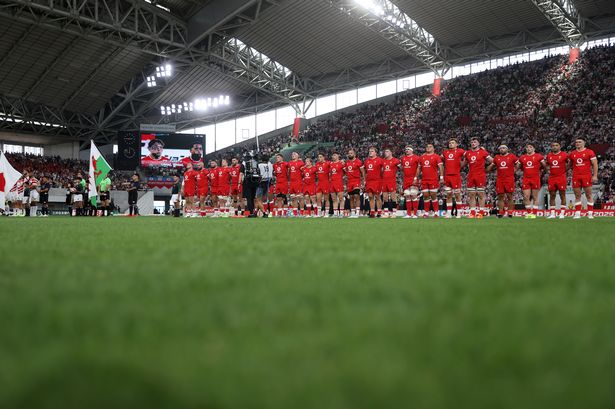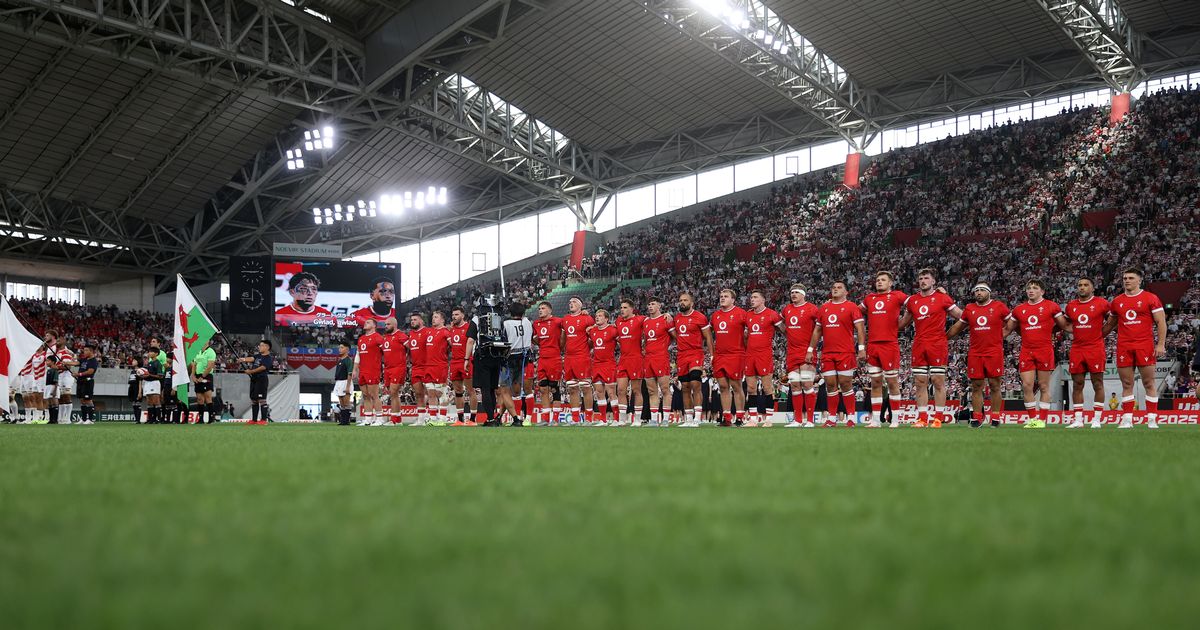The latest rugby news from Wales and around the world
07:46, 18 Jul 2025Updated 07:59, 18 Jul 2025
 Wales finally ended their losing run against Japan last weekend (Image: Huw Evans Picture Agency Ltd)
Wales finally ended their losing run against Japan last weekend (Image: Huw Evans Picture Agency Ltd)
Here are your rugby headlines for Friday, July 18.
Bevan issues grave Welsh rugby warning
Former Wales and British & Irish Lions wing John Bevan has issued a stark warning over the state of Welsh rugby, insisting the sport is on the brink of “oblivion” without deep and lasting reform.
Bevan, who played for Wales during the 1970s and toured with the Lions in 1971, says a complete overhaul is urgently required if the game in Wales is to survive — and thrive again in the long term.
“It’s root-and-branch,” he told The Times. “Root-and-branch, not cosmetic stuff.”
His sobering comments come at a critical time for Welsh rugby. The national team only recently ended an 18-Test losing streak, beating Japan in Kobe last weekend. But the result has done little to paper over the deep cracks in the game.
Off the field, the Welsh Rugby Union is under pressure amid ongoing speculation about the future of the domestic game, with talks ongoing over the possibility of reducing the number of professional regions from four to two. Such a move would have major implications for player development, regional identity and the sport’s popularity across Wales. Sign up to Inside Welsh rugby on Substack to get exclusive news stories and insight from behind the scenes in Welsh rugby.
Bevan believes only long-term commitment to proper structural change will offer hope.
“Somebody’s got to put their hands up and say, ‘It’s going to take 12 years minimum, but we’ve got to do it. We’re going to have to take it on the chin for 12 years, and we’ll be back, if everybody buys into it,’” he said.
“It’s going to be a painful 10 years, or it’s going to be the oblivion of rugby.”
Bevan’s comments echo concerns raised by other former players and coaches in recent months, who say the WRU has failed to put in place a coherent long-term plan for the game at all levels — from grassroots to professional to international.
Welsh rugby stalwart dies
Cardiff Rugby have led tributes following the passing of former player Carl Smith, who represented the club throughout the 1970s and went on to have a successful spell at Pontypridd.
Smith, a tough and committed back-row forward, played for Cardiff RFC between 1971 and 1980, featured during a celebrated era for the club based at the Arms Park. He famously scored a try for Cardiff in their game against the All Blacks in 1978.
He later moved to Pontypridd, where he continued to impress with his work rate, physicality and leadership on the field. He made 93 appearances for Ponty between 1980 and 1983.
A product of the Welsh rugby pathway, Smith also played for Wales Youth and Glamorgan County, underlining his pedigree at both regional and national representative levels. Many count him unlucky for not donning the No.8 shirt for Wales’ senior team.
Confirming the news in a statement, Cardiff Rugby said: “All of us at the Arms Park are saddened to learn of the passing of Carl Smith.
“The back-row forward played for Cardiff between 1971 and 1980 before moving to Pontypridd. He also played for Wales youth and Glamorgan. Our thoughts are with Carl’s family and friends on this sad day.”
Ponty’s Alun Granfield said: “The club has just heard that one of Pontypridd’s great former players has died. Carl Smith joined us at the start of the 1980-81 season and played 93 games for our club over the next three seasons, scoring 21 tries. At the end of the 1978-79 season Pontypridd had lost the services of arguably the best No. 8 in Wales at the time, Chris Seldon, who was constantly overlooked by the Welsh selectors and decided to try his luck in rugby league with St. Helens. Chris left a huge hole in our side, and it was difficult to see who could fill it. Then along came Carl.
“When he came to us Carl had spent 10 years with Cardiff playing 235 times, and a recent Cardiff website published a list of the greatest uncapped XV that the club could have put out, and Carl Smith was in it at No. 8. He could play at either No. 8 or at lock and the site said that he “was a fearsome sight on a rugby field” and simply a fantastic player and a great athlete. Very true!
“I understand that part of the reason that he left Cardiff was that they wanted him to play regularly at lock, and Carl felt that he still had a lot to offer in the back row. His career with Pontypridd proved him correct. He had power and pace, was great in defence and attack, and never shirked the hard stuff. He is remembered by us not so golden oldies at Pontypridd with great affection and respect and the club sends its condolences to Carl’s family on their huge loss.”
Nigel Owens responds to controversial Springboks act
Former international referee Nigel Owens has weighed in on the tactical innovations used by South Africa in their recent Test victory over Italy — questioning the legality and sportsmanship of the Springboks’ ploy.
The former Rugby World Cup final official took to social media and appeared on Whistle Watch, World Rugby’s refereeing show, to offer his expert verdict on two specific incidents: a kick-off routine involving Andre Esterhuizen, and a lineout-style maul formation in open play.
South Africa kicked off the match with a clever but contentious play, which saw Esterhuizen positioned in front of fly-half Manie Libbok as he executed a chip rather than a traditional long restart. The move led to confusion, and referee Andrew Brace awarded a scrum to Italy. But Owens said that decision didn’t go far enough.
“The key word is ‘deliberate’, because normally in this kind of situation, if a player is in front of the kick-off, it’s deemed to be offside and a scrum back,” Owens explained.
“The reason that is a scrum is because the kick tends to go at least 10 metres, so actually the effect of the players who may be slightly in front chasing that ball can be very, very minimal, if any effect at all.
“But then again, they are in front and for that reason it’s deemed to be an accidental offence and a scrum back.
“What we saw in this instance is it looks deliberate. It’s a ploy, it’s an action to get a scrum, so in this instance, if I was refereeing this game, to me that would be a pretty straightforward, clear penalty because it’s not a normal action.”
Owens concluded the Springboks should have been penalised for what he sees as a deliberate act to manipulate the laws — but admitted it could be a grey area going forward.
“If you look at this sanction, even if you think it’s deliberate or not, it’s an offence that can quite easily be penalised because of the action itself,” he added.
“Now, if you were to do that and kick it into touch deliberately, it becomes very, very difficult for a referee to decide whether that action was deliberate.
“If the referee feels, ‘hang on, you’re not pulling a quick one with me, I’m not happy with that action, that’s against the sportsmanship of the game’, under that law it becomes a penalty.
“The referee has the avenue, even if he can’t prove it’s deliberate or not, to penalise it. But if you’re not sure, it’s accidental and you tend to opt with a scrum.”
Women’s U20s lose to Italy
Wales Under-20s were narrowly beaten 28-24 by Italy in their final Six Nations Summer Series fixture in Ystrad Mynach.
Liza Burgess’ side led at half-time and were in contention until the final minutes, but a late try from Italy sealed a dramatic victory at the Centre for Sporting Excellence.
Italy struck first through Elena Errichiello midway through the first half, with Lavinia Pratichetti adding the extras to give the visitors a 7-0 advantage.
Wales responded well, hitting back through Molly Wakely on 25 minutes before Savannah Picton-Powell crossed five minutes before the interval. Hanna Marshall slotted the conversion to give Wales a 12-7 lead at the break.
Italy regained the lead shortly after the restart, with Chiara Cheli crossing and Pratichetti converting once again.
What followed was a frantic period of scoring as the lead changed hands three more times. Cheli bagged her second try of the match, either side of Welsh scores from Seren Singleton and Chiara Pearce — the latter converted by Ffion Williams — as the home side edged in front 24-21 heading into the closing stages.
But Cheli completed her hat-trick with six minutes to play, and another pinpoint Pratichetti conversion ensured Italy emerged with the win.
The result means Wales finish the Summer Series with one win from their three games. They began the campaign with a 27-10 loss to Ireland, bounced back impressively with a 52-20 victory over Scotland, but fell just short in their final outing.
Earlier in the day, Ireland thrashed Scotland 62-7, while England were due to face France in the final match of the tournament.
